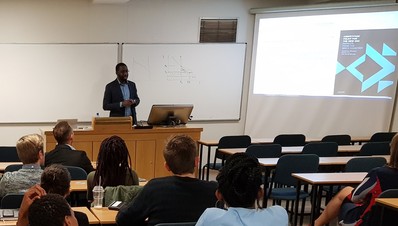Liberty Mncube: Concentration is not a dragon from the past
 Dr Liberty Mncube, Honorary Professor in the Department of Economics and Chief Economist of the Competition Commission, recently delivered a lecture at the Department about the extent of concentration in South Africa and appropriate regulatory responses from a competition policy perspective. He reflected that there is a growing recognition in government policy of the need to address exclusions and restrictions to competition, which may be standing in the way of transforming the economy. Supra-normal profit (economic rents) combined with low levels of growth, innovation, employment and investment may be partly attributable to high concentration levels. While acknowledging that there is little agreement in academia on the link between concentration and performance (inefficiency), Dr Mncube stressed that the evidence still points to high levels of concentration in many South African product markets, and argued that there is therefore a need to combine deconcentration policies with research on particular affected markets with the aim of encouraging competition without interfering with "organic efficiencies of integration", i.e. the ability of larger firms to innovate and reduce costs. Competition authorities need to continue effective enforcement in cases of anticompetitive conduct and generally promoting competition, including advocating against regulation in other spheres of policy that may have anticompetitive effects, such as trade protectionism. The Department of Economics is in the final stages of establishing a Centre for Competition Law and Economics, with whom Prof Mncube will be involved in both a teaching and research capacity.
Dr Liberty Mncube, Honorary Professor in the Department of Economics and Chief Economist of the Competition Commission, recently delivered a lecture at the Department about the extent of concentration in South Africa and appropriate regulatory responses from a competition policy perspective. He reflected that there is a growing recognition in government policy of the need to address exclusions and restrictions to competition, which may be standing in the way of transforming the economy. Supra-normal profit (economic rents) combined with low levels of growth, innovation, employment and investment may be partly attributable to high concentration levels. While acknowledging that there is little agreement in academia on the link between concentration and performance (inefficiency), Dr Mncube stressed that the evidence still points to high levels of concentration in many South African product markets, and argued that there is therefore a need to combine deconcentration policies with research on particular affected markets with the aim of encouraging competition without interfering with "organic efficiencies of integration", i.e. the ability of larger firms to innovate and reduce costs. Competition authorities need to continue effective enforcement in cases of anticompetitive conduct and generally promoting competition, including advocating against regulation in other spheres of policy that may have anticompetitive effects, such as trade protectionism. The Department of Economics is in the final stages of establishing a Centre for Competition Law and Economics, with whom Prof Mncube will be involved in both a teaching and research capacity.
Login
(for staff & registered students)
Upcoming Seminars
Monday 16 February 202612:10-13:10
Dr Matthew Olckers
Topic: "Do Digital Cash Transfers Create Persistent Financial Inclusion? Evidence from Mobile Money in Togo"
13:10-14:10
Prof Gregory Lane
Topic: "Beliefs, forecasts, and investments: Experimental evidence from India"
12:10-13:10
Frank Bohn
Topic: "The “Benefits” of being small: Loose fiscal policy in the European Monetary Union"
BER Weekly
23 Jan 2026 Free Weekly Review | Number 3 | 23 January 2026This report covers the key domestic and international data releases over the past week....
Read the full issue
Upcoming Seminars
Monday 16 February 202612:10-13:10
Dr Matthew Olckers
Topic: "Do Digital Cash Transfers Create Persistent Financial Inclusion? Evidence from Mobile Money in Togo"
13:10-14:10
Prof Gregory Lane
Topic: "Beliefs, forecasts, and investments: Experimental evidence from India"
12:10-13:10
Frank Bohn
Topic: "The “Benefits” of being small: Loose fiscal policy in the European Monetary Union"
BER Weekly
23 Jan 2026 Free Weekly Review | Number 3 | 23 January 2026This report covers the key domestic and international data releases over the past week....
Read the full issue
